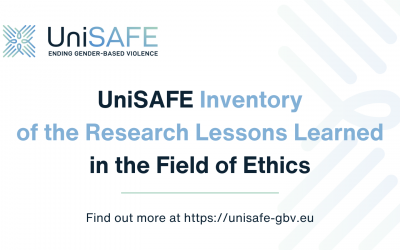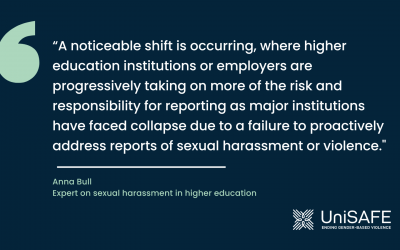On average, every other woman working in an EU member state has experienced sexual harassment since the age of 15 (FRA Survey). Women often live in an environment of sexist jokes, derogatory comments, demeaning remarks, harassing and violent conducts towards them. These everyday sexist practices impact women and girls at school, university, in the workplace or in the street. How can it still happen and why is it so difficult to stop?
Movements like #MeToo contributed to show how the socialization of women since childhood paves the way for sexism, gender stereotypes on women’s roles and subordination. Women are taught from a young age that they must adapt and accept. They are taught to be nice, to smile, to assume good intentions, to take care of others, to say yes. Whenever women do dare to speak up, they are told that they exaggerate, that they do not understand jokes or compliments, or even that they are hysterical.
Some studies (Bondestam, Lundquist) show that sexual harassment in the workplace, including in higher education, is more prevalent among lesbian and bisexual women, transgender, women of color, and individuals with disabilities. Precarious work conditions create an environment of vulnerability and marginalization of young researchers, particularly young women in the early stages of their career or working on temporary or short-term contracts. As Alexandria Ocasio-Cortes argued “It is always women* who are marginalised, it is the young, it is the intern, it is the immigrant, it is the trans. They are always most at risk, because society listens to them the least.”
Research on sexual and gender harassment in universities and research institutions so far has suggested that a general climate of accepting or tolerating sexual and gender harassment prevails in academia. Stories about reported students’ experiences of sexual harassment are often minimized by managers or deans, claiming that “nothing serious happened”. Their comment on possible harassment complaints usually target the complaining students or researchers and their “fake charges” towards professors or supervisors. Indeed, complaining students or researchers can be suspected of making up stories about being harassed because they were “lazy and did not prepare for the assignment in time” in order to void any serious consequences such as expulsion or suspension. When the general notion prevails that students’ misuse the situation to gain certain benefits, the reporting is hardly possible. This climate of mistrust contributes to the general notion that complaints of students or researchers who work on temporary contracts or are at early-career stages will not be taken seriously.
Hierarchical structures in academia can also contribute to the normalization of psychological, physical, sexual harassment on the grounds of gender and other identity aspects. Although the majority of victims are women and perpetrators are men, the victim, as well as the harasser, may be a woman or a man. In some scientific fields requiring to spend a lot of time in labs, fieldwork or other settings, the relationship between student or researcher and their supervisor can develop the grounds for dependency and compliance. Post-graduate students and researchers depend on their supervisor or mentor who have the power and authority to control research processes and career prospects. Top department leaders can also have a lot of power when they are in the position to attract funding. This power can be misused, but those depending on the funding would not dare to disclose any harassing behavior for fear of losing their job and/or being publicly shamed.
Within the UniSAFE project, we want to give a voice to researchers whose experiences and stories are often overlooked or unheard due to their specific situation in academia.
Dr. Vilana Pilinkaitė-Sotirovič, Lithuanian Social Research Centre



